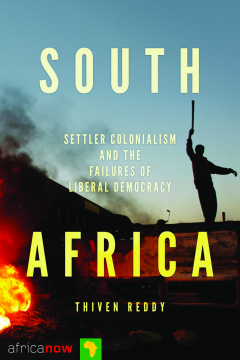
BOOK
South Africa, Settler Colonialism and the Failures of Liberal Democracy
(2015)
Additional Information
Book Details
Abstract
In South Africa, two unmistakable features describe post-Apartheid politics. The first is the formal framework of liberal democracy, including regular elections, multiple political parties and a range of progressive social rights. The second is the politics of the ‘extraordinary’, which includes a political discourse that relies on threats and the use of violence, the crude re-racialization of numerous conflicts, and protests over various popular grievances.
In this highly original work, Thiven Reddy shows how conventional approaches to understanding democratization have failed to capture the complexities of South Africa’s post-Apartheid transition. Rather, as a product of imperial expansion, the South African state, capitalism and citizen identities have been uniquely shaped by a particular mode of domination, namely settler colonialism.
South Africa, Settler Colonialism and the Failures of Liberal Democracy is an important work that sheds light on the nature of modernity, democracy and the complex politics of contemporary South Africa.
‘Offers a radical, dissenting and original analysis of contemporary South Africa’
Colin Bundy, Oxford University (Emeritus)
‘This is a book that South African political studies has been waiting for.’
Harry Garuba, University of Cape Town
‘An important attempt to provide us with a framework for understanding present-day South African politics.’
Anthony Bogues, Brown University
'Harnessing sophisticated scholarly literature on the subject, [Reddy] argues that South Africa’s past as a settler colony ruled for decades by authoritarian white supremacists has made its transition to liberal democracy particularly difficult.'
Foreign Affairs
Thiven Reddy is a senior lecturer in the Department of Political Studies, University of Cape Town. His previous publications include Hegemony and Resistance: Contesting Identities in South Africa.
Table of Contents
| Section Title | Page | Action | Price |
|---|---|---|---|
| Front Cover | Front cover | ||
| Africa Now | i | ||
| About the Author | ii | ||
| Title | iii | ||
| Copyright | iv | ||
| Contents | v | ||
| Acknowledgements | vi | ||
| Introduction\r | 1 | ||
| 1: Modernity: Civil Society, Political Society and the Vulnerable\r | 11 | ||
| Elite vs Mass Politics | 12 | ||
| National-Modern Crisis: The ‘Intermediary Class’, National Liberation and Compromise\r | 21 | ||
| The Crisis of the National-Modern and Civil and Political Society | 26 | ||
| Theoretical Apparatus | 35 | ||
| Conclusion | 39 | ||
| 2: The Limits of the Conventional Paradigm, Modernity and South African Democracy | 41 | ||
| South African Democratic Studies and the Influence of Modernisation Theory | 41 | ||
| Disciplinary Knowledge, the Post-world War II Context and Imperial Power\r | 43 | ||
| The Idea of Political Development? | 46 | ||
| The Specificity of Settler-Colonial Relations as a Path towards Modernity | 52 | ||
| Some Elements of Radical Critique | 56 | ||
| Conclusion | 61 | ||
| 3: The Fanonian Paradigm, Settler Colonialism and South African Democracy | 63 | ||
| Biko and the Limits of Non-Racialism as Antidote to the White Power Structure\r | 63 | ||
| Fanon’s Colonial Situation as Domination without Hegemony | 68 | ||
| Postcolonial Aporias | 79 | ||
| Conclusion | 82 | ||
| 4: The Colonial State and Settler-Colonial modernism\r | 83 | ||
| Understanding Modernity and Its Questions in South Africa | 83 | ||
| The Colonial Situation as Violent Rupture | 88 | ||
| The Colonial State and War-Making | 90 | ||
| Foucault and the Production of Docile Subjects | 95 | ||
| The Colonial Situation and the Constitution of Class | 98 | ||
| Apartheid Takes Manichaeism to Its Logical Extreme | 102 | ||
| Conclusion | 106 | ||
| 5: Nationalism, ANC and Domination without Hegemony | 107 | ||
| Dilemmas of Anti-Colonial Nationalism\r | 109 | ||
| The National Elite and Going It Alone | 112 | ||
| The Struggle and Its Subjects: The Elite Embrace Mass Politics \r | 117 | ||
| The Politics of Mobilisation: The 1950s Failure \r | 121 | ||
| The Second Mobilisation: 1970s and 1980s | 128 | ||
| Conclusion | 131 | ||
| 6: Elites, Masses and Democratic Change | 133 | ||
| Drawing New Boundaries between the Political and the Criminal | 134 | ||
| A ‘Peace Settlement’ as Opposed to Violence | 137 | ||
| Elite Politics as Rational and ‘Black-on-Black’ Violence as Irrational\r | 139 | ||
| Agenda-Setting: The Disputes were Not About the End, But Strategy | 143 | ||
| Negotiations and the Problem of the Popular: The Emergence of Legal Discourse, the Political and Outsiders\r | 146 | ||
| Concluding Remarks | 149 | ||
| 7: Crisis of the National Modern: Democracy, the State and ANC Dominance\r | 151 | ||
| The Tutu-Mbeki Debate | 153 | ||
| The ANC and the Idea of ‘The State’ | 158 | ||
| Mandela, The Figure of Modern Charisma: A ‘Smooth’ Transition? | 162 | ||
| The Figure of Rational-Legalism: From Exile to the Bureaucratic Approach to Politics\r | 167 | ||
| Conclusion | 185 | ||
| Conclusion | 187 | ||
| References | 193 | ||
| Index | 207 | ||
| Back Cover | Back cover |
